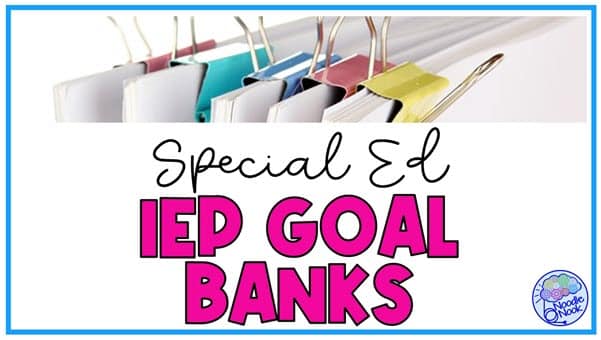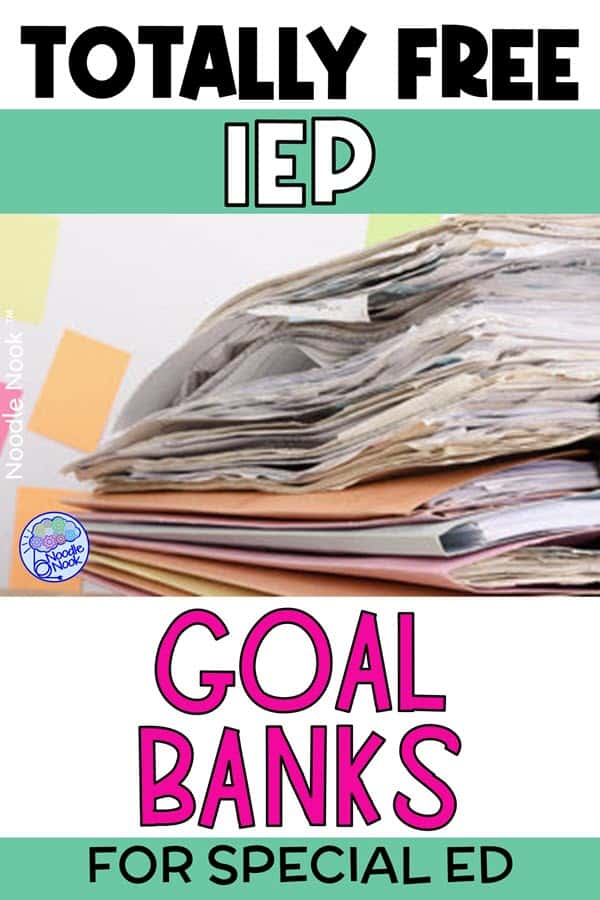IEP Goal Bank for Autism Units, LID, or PMLD
I have been there. I really have. You are sitting in front of a computer screen tasked with writing IEP goals for a student. You sit there, glazed over, wondering what to write. And it’s not that you don’t know your students. It’s not that you’re unable to write good IEP goals. The thing is you’re just not sure where they should go next. Once they master a goal, what is the logical next step? You need an IEP goal bank!
What is the Next Step in Skill Development
Start with the end in mind.
The reason your IEP committee discusses transition planning with the team is because you are always thinking of the end result. You always want to design goals with the student’s post-secondary goals in mind. If you student wants to work at Home Depot as a cashier, then you better make sure they can make change and count money. That means designing a goal with that money skill in mind.
If they want to work at Home Depot stocking shelves, money may not be as important. Maybe 1:1 number recognition with longer numbers is so they can read and match bar codes.
What if they will never work at Home Depot… or anywhere else for that matter. Maybe supported employment is their destination. Spending time on money or long number recognition may be a waste of time and energy. They may benefit from 1:1 correspondence so they can count to 5 or 10 independently.
The point is, if you don’t know where they are going, you won’t know where to start. Always have the end goal in mind.
Not sure what the end goal is? Try this basic transition survey to see what the student wants and then expand from there.
Do Some Task Analysis
When you think of a skill you want to teach a student with significant disabilities, you will have to think of all the steps that make up the skill.
Think of the cashier at Home Depot. If you want to be able to run the register correctly, you will have to be able to understand and manipulate the computer system, money, and provide good customer service. As the stocker, however, you will need a totally different set of skills.
To be able to teach a student skills that will support them in their postsecondary, you will have to think of all the parts of the whole. The cashier may need a technology goal to be able to match pictures to words correctly, a reading goal to read independently at a third grade level so they can manage the register prompts as they occur, and a math goal to be able to count money to $100 with mixed bills and coins.
This collection of goals will support their postsecondary goal, but also provide a great foundation to their general education. But it all starts with thinking about the parts of the overall skill.
Remember Soft Skills
In the Home Depot example above, there wasn’t a goal so specific that the student would not be able to get a meaningful job somewhere else. If this same student wanted to work at McDonald’s as a cashier, they would be able to transfer the skills.
That is another important part of designing a great and meaningful goal… don’t get too specific to a single occupation or postsecondary outcome.
How many times did you change your major? Yeah… me too. If I had to lock into the profession I wanted when I was in K-12, I may be a ballerina, astronaut, or lawyer right now. Developing soft skills like social acuity, functional reading or reading to a 2nd grade level or better, and managing time help student no matter their postsecondary outcomes.
So don’t get too narrow with the goals.
Need Specific Content IEP Goal Banks
If you’re teaching specific content areas or need goals that target a specific skill, then check out these specific goal-related blog posts:
- Read more on IEP Transition Goal Banks for goals that prepare students for their postsecondary life after graduation. And here are some goals for Pre-Vocational IEP Goals that support transition too.
- Reading Comprehension IEP Goals are perfect for any grade where students are targeting literacy needs.
- Wanna score some Spelling Goals to help with that literacy skill? Got you right here!
- When your students are still working on phonemic awareness, these goals will help you and your students, Phonemic Awareness IEP Goals.
- If you are working to improve writing, try these Written Expression IEP Goals, which also work for speech and language targets.
- Goals reach beyond just academics. If you need IEP Goals for Anxiety, these will help you get there and give you some ideas too!
- And if behavior got you down, then try these Behavior IEP Goals. But if ADHD Goals are on your mind, then you need this post with IEP Goals and Objectives for ADHD with Examples.
- Although this isn’t an IEP Goal Bank, here is a post about writing student Strengths and Weaknesses in an IEP with a FREE printable to support you!
Then check out this post on HOW to Write an IEP Goal with great tips (especially for new special ed teachers) and print this IEP-At-A-Glance to make management easier!
Okay, But Still Not Sure Where to Go?
There are several places to get an IEP goal bank for Autism Units, LID and PMLD…
- I loved this IEP goal bank when I first started. I used FACES a lot because I felt like it gave me a general idea of the next step in skill development. It is broken into specific content areas including academic and functional, and that helped me out a lot. Here is the link: FACES GOAL BANK
- I also love the NASET examples of IEP goals for student with Autism. They approach skills with the areas of Social Skills, Life Skills, and Communication Skills in mind. You can find the link here: NASET EXAMPLE GOALS
- The Bridges4Kids.org website has a goal bank that is also broken into content areas and, even further, into specific skills inside of each content area. Then those skills are broken down into several objectives. Depending on how your district does IEP goal writing, you may be able to use this format. If not, the sequencing is still super helpful. Check out their bank here: BRIDGES GOAL BANK
- If you are still new with goal writing in general and need some support to set up the goal and word if correctly, there is a great checklist of components available from Wrightslaw. The format is not very appealing, but the information is priceless. Once you see the 5 parts of a goal, your writing-world will be forever changed! Check out the IEP Goal document here: WRIGHTSLAW IEP GOALS
- Are you working with secondary students and need more ideas about postsecondary goals and outcomes so you can write great transition goals? I got you… this document from the Bureau of Special Education can help. You pick the domain (like Independent Skills or Community Participation) and there is a list of goals that can support those transition needs. Check out that great resource here: BUREAU OF SPECIAL EDUCATION
- If you have student who need speech or communication related goals, this may be the IEP goal bank you’ve been looking for- from the Speaking of Speech website, their goal bank is full of speechie goalness. Check it out here: SPEAKING OF SPEECH GOALS
- Finally, The Goal Bank has oodles of goals to get you going in the right direction. Although several of the academic goals may be too much for your students, the functional goals hit the nail on the head. You can find the functional goals here: FUNCTIONAL GOAL BANK. There is also an Additional Goal Index for prerequisite skills found HERE. Or, if you want the full bank, start navigating from here: GOAL BANK

IEP Goal Banks for Autism Units, LID and PMLD
I hope this gives you some starting points for your next IEP meeting. Do you also have to write a BIP? Check out this post on How to Write a Killer BIP. Now quit messing around and get back to work!
Article Citation: [cite]






Oh my gosh! I so needed this! I started my teaching job just this semester and have been struggling a little with writing good goals. These banks really helped.
Thanks!
God bless you!
Thank you so much for the abundant info!!
Comments are closed.